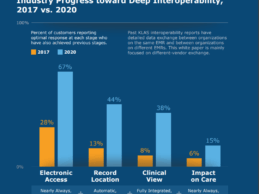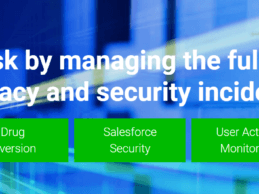What You Should Know:
- New CHIME-KLAS interoperability report reveals steady
progress in some areas related to interoperability and leaps forward in others.
- A total of 67% of provider organizations reported they
often or nearly always had access to needed records in 2020, up from 28% in
2017. Providers noted improvements in functionality and usability for tasks
like locating and viewing records.
Both providers and the companies that produce the hardware and software needed
Read More
EMR
Intelligent Automation of the Revenue Cycle: How an Integrated Platform Approach Yields Financial Results
Healthcare provider networks are experiencing enormous pressure to manage financial margins and invest in contactless patient experiences. With overall financial losses projected to exceed $323 billion as a result of COVID-19, a projected $200 billion in administrative waste due to revenue cycle inefficiencies, and increasing pressure to meet digital consumerism demands, it is essential for health systems to find ways to streamline processes, maximize their revenue cycles and cut costs. These
Read More
Traditional RESTful APIs Will Not Solve Healthcare’s Biggest Interoperability Problems
Interoperability is a big discussion in health care, with
new regulations requiring interoperability for patient data. Most approaches
follow the typical RESTful API approach that has become the standard method for
data exchange. Yet Health Level Seven (HL7), with its new Fast Healthcare Interoperability
Resources (FHIR) standard for the electronic transfer of health data, is
leading to a rash of implementations that, to date, are not solving core interoperability
issues.
Data is still
Read More
Meaningful Use of Genomics Requires Informatics Beyond EMRs
Electronic medical records (EMRs) are widely expected to serve as a cornerstone technology that drives the delivery of modern patient care.
But can the EMR alone support all the informatics capabilities required by an ever-evolving healthcare industry? The rapid growth of precision medicine, particularly the use of genetic and genomic information during clinical decision making, is a compelling example that functionality beyond the EMR is required. Not only does genomic data represent a
Read More
How to Capitalize on Digital Health Momentum in 2021
As we re-examine the healthcare system in the wake of the pandemic, we are continually identifying opportunities to rebuild parts of the system to new and improved specifications. One critical facet is digital health, where we continue to struggle with what should really be table stakes: the ability to integrate data from disparate organizations and systems into a unified view of the whole person and take action.
During the height of the pandemic, telehealth made it possible to deliver care
Read More
Despite COVID-19: Providers Should Not Lose Sight of MIPS Compliance
When 2020 began, no one anticipated that complying with the Merit-based Incentive Payment System (MIPS)—the flagship payment model of the Centers for Medicare & Medicaid Services (CMS) Quality Payment Program (QPP)—would look so different halfway through the year. Like many other things, the COVID-19 crisis has delayed, diverted, or derailed many organizations’ reporting efforts and capabilities. Lower procedure volumes, new remote work scenarios, and shifting priorities have taken attention
Read More
M&A: Imprivata Acquires Patient Privacy Intelligence Company FairWarning
What You Should Know:
- Imprivata acquires FairWarning Technologies, a provider
of patient privacy intelligence.
- The combined solutions will offer healthcare a single Digital Identity platform that integrates role-based access controls, identity governance, and data privacy compliance.
Imprivata®, the digital identity company for healthcare, today announced the acquisition
of FairWarning
Technologies, LLC, a Clearwater, FL-based provider of patient privacy intelligence.
Read More
KLAS: Epic, NextGen, Cerner Best at Making Outside Patient Data Usable
What You Should Know:
- New KLAS report finds acute and ambulatory care EMR
vendors Cerner, Epic and NextGen are best at making outside patient data usable
for clinicians (data from outside the clinician's health system).
- KLAS report examines adoption and usability among advanced
users of the main acute and ambulatory care EMR vendors.
The national interoperability networks of Carequality and CommonWell Health Alliance have become some of the primary means by which patient records
Read More
Epic Pharmacy Progress Made But Gaps Remain, KLAS Report Finds
What You Should Know:
- Despite pressure to take an Epic-first approach to
software decisions, many pharmacies at Epic organizations have held on to
third-party products due to the relative immaturity of some of Epic’s more
recently developed pharmacy solutions.
- Latest KLAS report explores medication inventory
management (MIM) and IV workflow management—the two areas where Epic has
focused much of their development efforts—to validate what capabilities these
modules deliver and where
Read More
Baptist Health Implements First-of-its-Kind ED to PCP Referral Automation
What You Should Know:
- Baptist Health deploys first-of-its-kind conversational
digital assistant powered by LifeLink for patients who are discharged from the
Emergency Department (ED) with referrals.
- Since launch, the conversational chatbot solution, which
engages patients with mobile messaging to recommend follow-up care, the number
of PCP appointment requests have increased by 15%. The technology is integrated
into Cerner and Salesforce, personalizing the patient experience by
Read More










